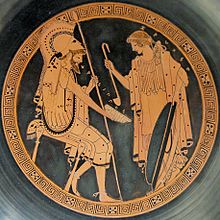| Chrysippus | |
|---|---|
 Illustration of Zeuxo pouring wine for Chrysippus, depicted on a Greek vase Illustration of Zeuxo pouring wine for Chrysippus, depicted on a Greek vase | |
| Abode | Elis |
| Genealogy | |
| Parents | Pelops and Axioche |
| Siblings | Atreus, Thyestes, Pittheus and many more |
In Greek mythology, Chrysippus (/kraɪˈsɪpəs, krɪ-/; Greek: Χρύσιππος, romanized: Chrýsippos, lit. 'golden horse') was a divine hero of Elis in the Peloponnesus (Greece), sometimes referred to as Chrysippus of Pisa.
Family
Chrysippus was the bastard son of Pelops, king of Pisa in the Peloponnesus, and the nymph Axioche or Danais. According to Pseudo-Plutarch, of all his children Pelops loved Chrysippus best.
Mythology
Chrysippus was kidnapped by the Theban prince Laius, his tutor, who was escorting him to the Nemean Games, where the boy planned to compete. Instead, Laius carried him off to Thebes and raped him, a crime for which he, his city, and his family were later punished by the gods. Others named as Chrysippus' kidnappers Zeus and even Theseus. In one version Chrysippus' father Pelops, following his son's abduction, curses Laius to be killed by one of his own children.
Chrysippus's death was related in various ways. One author who cites Peisandros as his source claims that he killed himself with his sword out of shame. Hellanicus of Lesbos and Thucydides writes that he was killed out of jealousy by Atreus and Thyestes, his half-brothers, who cast him into a well. This is usually on their mother Hippodamia's suggestion; after Pelops blamed her for Chrysippus' demise, she killed herself or withdrew to Midea in the Argolid.
The death of Chrysippus is sometimes seen as springing from the curse that Myrtilus placed on Pelops for his betrayal, as Pelops threw him from a cliff after he helped Pelops win a race.
Euripides wrote a play called Chrysippus, whose plot covered Chrysippus' death. The play is now lost. The play was given in the same trilogy that included The Phoenician Women.
See also
References
- Stephen Fry in Mythos (2019) ISBN 978-1452178912
- Scholia ad Euripides, Orestes 5; ad Pindar, Olympian Odes 1.144
- Pseudo-Plutarch, Greek and Roman Parallel Stories 33
- Apollodorus, 3.5.5; Hyginus, Fabulae 85
- Athenaeus, Scholars at Dinner 13.79
- Hyginus, Fabulae 271
- Scholia ad Euripides, The Phoenician Women 1605
- Scholia ad Euripides, The Phoenician Women 1748
- Gantz, p. 489.
- Hyginus, Fabulae 243
- Pausanias, Description of Greece 6.20.7
- Sophocles, Electra 504-515
- Apollodorus, Epitome 2.8
Bibliography
Ancient sources
- Sophocles, The Electra of Sophocles. Edited with introduction and notes by Sir Richard Jebb. Sir Richard Jebb. Cambridge. Cambridge University Press. 1894. Cambridge: University Press Warehouse, Ave Maria Lane. Glasgow: 363, Argyle Street. Online version at the Perseus Digital Library.
- Apollodorus, Apollodorus, The Library, with an English Translation by Sir James George Frazer, F.B.A., F.R.S. in 2 Volumes. Cambridge, MA, Harvard University Press; London, William Heinemann Ltd. 1921. Online version at the Perseus Digital Library.
- Hyginus, Gaius Julius, The Myths of Hyginus. Edited and translated by Mary A. Grant, Lawrence: University of Kansas Press, 1960.
- Pausanias, Pausanias Description of Greece with an English Translation by W.H.S. Jones, Litt.D., and H.A. Ormerod, M.A., in 4 Volumes. Cambridge, MA, Harvard University Press; London, William Heinemann Ltd. 1918. Online version at the Perseus Digital Library.
- Plutarch, Moralia. with an English Translation by. Frank Cole Babbitt. Cambridge, MA. Harvard University Press. London. William Heinemann Ltd. 1936. 4. Online version at topos text.
- Athenaeus (1927–1941). Gulick, Charles Burton (ed.). Deipnosophistae. Loeb Classical Library (in Ancient Greek). Heinemann & Harvard University Press. 15 books in 7 vols. LCCN 28004492. OCLC 688821.
Modern sources
- Gantz, Timothy (1993). Early Greek Myth. Baltimore: Johns Hopkins University Press.
- Kerenyi, Karl (1959). The Heroes of the Greeks. New York/London: Thames and Hudson.